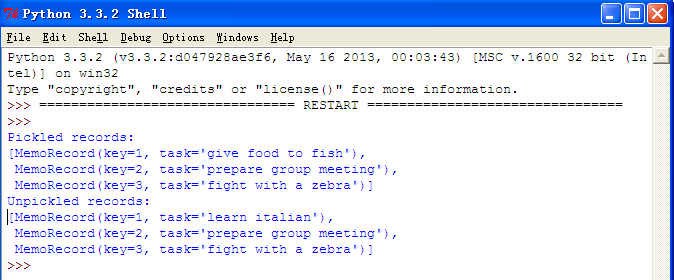python开发_pickle
pickle模块使用的数据格式是python专用的,并且不同版本不向后兼容,同时也不能被其他语言说识别。要和其他语言交互,可以使用内置的json包使用pickle模块你可以把Python对象直接保存到文件,而不需要把他们转化为字符串,也不用底层的文件访问操作把它们写入到一个二进制文件里。 pickle模块会创建一个python语言专用的二进制格式,你基本上不用考虑任何文件细节,它会帮你干净利落地完成读写独享操作,唯一需要的只是一个合法的文件句柄。
pickle模块中的两个主要函数是dump()和load()。dump()函数接受一个文件句柄和一个数据对象作为参数,把数据对象以特定的格式保存到给定的文件中。当我们使用load()函数从文件中取出已保存的对象时,pickle知道如何恢复这些对象到它们本来的格式。
dumps()函数执行和dump() 函数相同的序列化。取代接受流对象并将序列化后的数据保存到磁盘文件,这个函数简单的返回序列化的数据。
loads()函数执行和load() 函数一样的反序列化。取代接受一个流对象并去文件读取序列化后的数据,它接受包含序列化后的数据的str对象, 直接返回的对象。
cPickle是pickle得一个更快得C语言编译版本。
pickle和cPickle相当于java的序列化和反序列化操作
以上来源:http://www.2cto.com/kf/201009/74973.html
下面是python的API中的Example:
1 # Simple example presenting how persistent ID can be used to pickle 2 # external objects by reference. 3 4 import pickle 5 import sqlite3 6 from collections import namedtuple 7 8 # Simple class representing a record in our database. 9 MemoRecord = namedtuple("MemoRecord", "key, task") 10 11 class DBPickler(pickle.Pickler): 12 13 def persistent_id(self, obj): 14 # Instead of pickling MemoRecord as a regular class instance, we emit a 15 # persistent ID. 16 if isinstance(obj, MemoRecord): 17 # Here, our persistent ID is simply a tuple, containing a tag and a 18 # key, which refers to a specific record in the database. 19 return ("MemoRecord", obj.key) 20 else: 21 # If obj does not have a persistent ID, return None. This means obj 22 # needs to be pickled as usual. 23 return None 24 25 26 class DBUnpickler(pickle.Unpickler): 27 28 def __init__(self, file, connection): 29 super().__init__(file) 30 self.connection = connection 31 32 def persistent_load(self, pid): 33 # This method is invoked whenever a persistent ID is encountered. 34 # Here, pid is the tuple returned by DBPickler. 35 cursor = self.connection.cursor() 36 type_tag, key_id = pid 37 if type_tag == "MemoRecord": 38 # Fetch the referenced record from the database and return it. 39 cursor.execute("SELECT * FROM memos WHERE key=?", (str(key_id),)) 40 key, task = cursor.fetchone() 41 return MemoRecord(key, task) 42 else: 43 # Always raises an error if you cannot return the correct object. 44 # Otherwise, the unpickler will think None is the object referenced 45 # by the persistent ID. 46 raise pickle.UnpicklingError("unsupported persistent object") 47 48 49 def main(): 50 import io 51 import pprint 52 53 # Initialize and populate our database. 54 conn = sqlite3.connect(":memory:") 55 cursor = conn.cursor() 56 cursor.execute("CREATE TABLE memos(key INTEGER PRIMARY KEY, task TEXT)") 57 tasks = ( 58 'give food to fish', 59 'prepare group meeting', 60 'fight with a zebra', 61 ) 62 for task in tasks: 63 cursor.execute("INSERT INTO memos VALUES(NULL, ?)", (task,)) 64 65 # Fetch the records to be pickled. 66 cursor.execute("SELECT * FROM memos") 67 memos = [MemoRecord(key, task) for key, task in cursor] 68 # Save the records using our custom DBPickler. 69 file = io.BytesIO() 70 DBPickler(file).dump(memos) 71 72 print("Pickled records:") 73 pprint.pprint(memos) 74 75 # Update a record, just for good measure. 76 cursor.execute("UPDATE memos SET task='learn italian' WHERE key=1") 77 78 # Load the records from the pickle data stream. 79 file.seek(0) 80 memos = DBUnpickler(file, conn).load() 81 82 print("Unpickled records:") 83 pprint.pprint(memos) 84 85 86 if __name__ == '__main__': 87 main()
运行效果:


 浙公网安备 33010602011771号
浙公网安备 33010602011771号